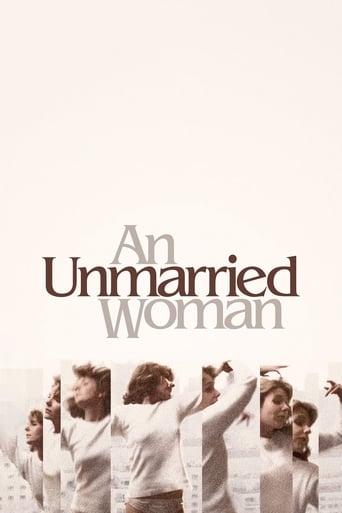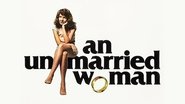sirenebern
I have enjoyed all of Paul Mazursky's films, and this is one of his very best. "An Unmarried Woman" sensitively examines some of the hot social topics of its era: divorce, women exploring career opportunities outside of their traditional wife/mother roles, sex, psychoanalysis. Erica (Jill Clayburgh in her most famous role) is an art gallery manager whose stock broker husband abruptly tells her that he's fallen in love with a much younger woman and is leaving their marriage. Erica's life and emotions go into a tailspin, and the audience cannot help but feel her anguish and confusion as she goes through transitions of grief over the end of her marriage. How does she deal with being an unmarried woman when she always assumed she'd be a married one? Erica regains her footing due to her career and confidence in herself, and meets some exciting new men in the art world, including a dashing, famous painter played by dishy Alan Bates. Although "An Unmarried Woman" is very much of a film of its late '70s era, with a sharp focus on divorce, no-strings-attached sexual encounters and psychoanalysis, the underlying issues still feel very relevant to viewers today. Mazursky brings a mature, sensitive eye to the complex feelings and experiences of his characters as they navigate the pain of divorce and the confusing process of finding new love. I particularly enjoy seeing the Manhattan of that time, especially the gritty art scene downtown. Cliff Gorman's apartment would probably cost a fortune today, but back then, he was living in a grubby neighborhood! Enjoy this movie to explore great performances (especially Clayburgh), as well as a glamorous snapshot of '70s New York lifestyles.
gavin6942
A wealthy woman from Manhattan's Upper East Side struggles to deal with her new identity and her sexuality after her husband of 16 years leaves her for a younger woman.Maybe I live in the wrong era, but this film struck me as so bizarre. I can understand going through a shocking transition when divorce comes at you out of nowhere. That part of the film was handled very well, even if a bit over the top.What I did not understand was the film's obsession with sex. At one point the woman comments that she had not had sex in seven weeks and thought her world was falling apart. Some of the happiest couples go years... if you are measuring your happiness in sexual encounters, I do not think you fully understand what it means to love someone.
aboutagirly
Jill Clayburgh plays an affluent New Yorker whose life crumbles when her husband reveals that's he's having an affair and wants a divorce. What's a woman to do when everything she's built her life around is suddenly whisked away? This feminist anthem from Paul Mazursky is well meaning but also condescending. It's a movie that was clearly made by a man, and it's a man's guess at what a feminist awakening would look and feel like, rather than the real thing. Therefore, it records Clayburgh's emotional development with the neatness of a house wife checking off items on a grocery list, and even throws in a lesbian daughter just to prove that there are women out there who don't need men at all, as if that's even remotely what feminism is about.Clayburgh is game, but she's better than the movie.
paul_johnr
While it's another thing to claim she was ripped off, it is very hard to accept that Jill Clayburgh was outvoted for an Academy Award after breaking new ground in Paul Mazursky's compelling drama on the divorces of American women. 'An Unmarried Woman' will most likely be the film for which Clayburgh is best remembered, since her Oscar-nominated role opened the door to countless 'relationship' films and television series that appeared later. 'An Unmarried Woman' helped bring divorce and the female sexual experience to mainstream film and TV, still under-the-covers topics in 1978. Nowadays, there is a 'Sex and the City' for every 'Kramer vs. Kramer' and one 'Desperate Housewives' for each and every 'Terms of Endearment,' owing greatly to the impact of this picture.In the new millennium, divorce is taken so much for granted that emotional scars are frequently overlooked. 'An Unmarried Woman' nevertheless hits home with crude realities and hits hard. Paul Mazursky, acclaimed in 1976 for 'Next Stop, Greenwich Village,' draws a scene rich in despair where men turn their backs on devoted wives, children face enormous personal loss, and lives struggle to be rebuilt. And 'An Unmarried Woman' has that needed silver lining, putting humorous spins on a person's climb to independence and the overcoming of setbacks.Jill Clayburgh plays Erica Benton, a Vassar graduate who has accepted three challenging roles in late 1970s New York: art gallery curator, wife of sporty investor Martin (Michael Murphy), and mother to teenaged girl Patti (Lisa Lucas). Erica serves as the hub in a large group of acquaintances who each carry different perspectives on love and sex. She meets weekly with a group of ladies that includes Jeannette (Linda Miller), a divorcée now playing the field, and Sue (Patricia Quinn), a married woman who has accepted her husband's infidelities. On the male side, uncouth sculptor Charlie (Cliff Gorman) lectures Erica on the 'need' to sleep around and English painter Saul (Alan Bates) becomes a part of Erica's life after meeting at an exhibition. The film is very much a diary of Erica's battles against fear, from the early trauma of separation to her small gaining of freedom.Clayburgh gives a typically understated performance that fits her character like a shoe. Erica is a woman suffering from within and never does Clayburgh stoop to melodrama or overstate emotions. The entire cast, in fact, keeps feelings on a realistic level for most of the story. This is helped by the taut writing and direction of Paul Mazursky, whose screenplay goes to the essence of human thought and conversation. People in Mazursky's script genuinely resent, hope, fall in love, laugh, cry. 'An Unmarried Woman' is above and beyond the typical soap opera framework, examining how we confront betrayal and desire.The performances are excellent all around. Michael Murphy succeeds in the role of a husband whose uncontrolled lust destroys his family. Lisa Lucas wonderfully portrays Patti Benton and wins even deeper sympathy than Erica as an intelligent young woman who loses her father. The supporting cast that includes Alan Bates, Cliff Gorman, Linda Miller, Patricia Quinn, and Kelly Bishop (as Elaine) makes up a complex landscape of opinion from which Erica must pick and choose.'An Unmarried Woman' is a thoroughly New York film, using locations in Soho and the Manhattan financial district. Exterior shots are brimming with life under Mazursky's direction; they are filled with extras and offer a strong New York vibe. Cinematographer Arthur Ornitz ('Requiem for a Heavyweight,' 'Death Wish,' 'Next Stop, Greenwich Village') keeps things simple throughout, using bright photography and largely white interiors. Bill Conti's score is often intrusive with its booming saxophone, but does capture feelings that jazzed up the late 70s.This film has its weaknesses, as the important breakup scene between Martin and Erica seems a bit overdone and Martin's sincerity is a lingering question. While shedding new light on the topic of divorce, it is from a largely middle class perspective; Erica is well-educated, financially sound, and has the credentials to start anew. The meetings between Erica and her psychiatrist Tanya (Penelope Russianoff, a real-life psychologist) are fascinating, but it is treatment not readily available to everyone. Technically speaking, the editing by Stuart Pappé looks a bit choppy in scene transitions; however, it does not upset the movie's flow. These problems are secondary, as the film offers powerful situations that every adult can relate to. Overall, it is a great trailblazer of women's film.To my disappointment, 'An Unmarried Woman' has been released on a poor-quality DVD by 20th Century Fox Home Entertainment. Mazursky and Clayburgh pair up for a commentary track that is the only redeeming feature of this disc. Besides a jewel case that features Clayburgh in black underwear (?), the film is presented in widescreen with a choice of English mono or English stereo; Spanish and French mono are offered besides English and Spanish subtitles. While its overall print quality is good, the DVD's exteriors and white interiors reveal far too much grain for my liking. English mono is once again the better audio choice, as its stereo version gives too much weight to background and muffles dialogue. Mazursky and Clayburgh do make insightful comments on the production and give life to this otherwise blah retail. 20th Century Fox's theatrical trailer is provided as a second extra.*** out of 4




